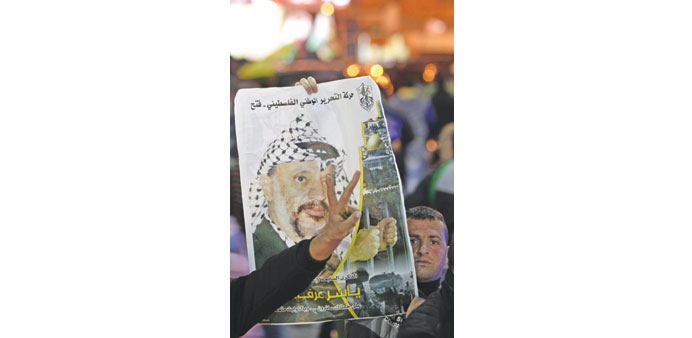A Fatah supporter flashes the victory sign in front of a poster of late Palestinian leader Yasser Arafat during a demonstration in support of Palestinian President Mahmoud Abbas in Hebron on Tuesday.
A White House spokesman says the “tit for tat” actions are counterproductive but that despite ominous signs, the US administration still believes diplomacy has a chance
Israel and the Palestinians both drew criticism from the White House yesterday for tit-for-tat moves that have brought US-sponsored peace talks close to collapse.
More than 15 months of repeated rounds of shuttle diplomacy by Secretary of State John Kerry were in jeopardy after Israel made a new bid to expand settlements in annexed Arab East Jerusalem and the Palestinians took fresh steps towards seeking recognition of their promised state.
White House deputy spokesman Josh Earnest expressed disappointment at “unhelpful, unilateral actions both parties have taken in recent days”.
He added that “tit for tat” actions were counterproductive but that despite ominous signs, the US administration still believed diplomacy had a chance.
“There is a path for us to diplomatically find a way for there to be a safe, secure Jewish state of Israel existing alongside an independent, secure Palestinian state as well,” Earnest told reporters aboard Air Force One.
The trigger for the crisis was Israel’s refusal to release 26 Palestinian prisoners by a weekend deadline, prompting a Palestinian move to sign 15 international treaties as a way of unilaterally furthering their claim for statehood.
Both sides regarded the other’s move as a violation of the undertakings they had given when the current round of peace talks were launched last July under Kerry’s sponsorship after a three-year hiatus.
They left in tatters Kerry’s frenetic efforts to broker an extension of the negotiations beyond their original April 29 deadline.
Despite the treaty move, a senior Palestinian official insisted President Mahmoud Abbas remained committed to the US peace efforts.
“The Palestinian leadership... wants the political process to continue. But we want a real political process, without tricks,” said Yasser Abed Rabbo, secretary general of the Palestine Liberation Organisation’s executive committee.
Palestinian Foreign Minister Riyad al-Malki echoed the support for talks, but said the membership request for the international conventions had been submitted.
The United Nations confirmed its special envoy on Middle East peace, Robert Serry, had received Palestinian requests to join 13 international conventions and treaties.
The treaties include the Vienna Convention on diplomatic relations, the convention on the rights of the child, the convention against torture, and one against corruption.
The Palestinian Authority has also asked Switzerland if it can join the Fourth Geneva Convention from August 1949 and the first additional protocol. And it has asked the Netherlands if it can join the Hague Convention of 1907 on laws and customs governing war.
In November 2012, the Palestinians won the status of an observer state in the United Nations, which allows them access to a number of conventions and international organisations.
But as part of a reciprocal arrangement which facilitated the resumption of peace talks last year, they pledged to freeze all moves to seek membership in UN organisations in return for Israel’s release of the veteran Arab prisoners.
The Palestinians have repeatedly said when the nine-month peace talks end on April 29, they would resume moves to join UN agencies to further legal claims against Israel over its settlement construction on land they want for a future state.
Abbas said the first of the 15 treaties he had applied to adhere to on Tuesday was the Fourth Geneva Convention, which holds huge symbolic importance for the Palestinians as it provides the legal basis of their rejection of Israeli settlements in the occupied territories.
In Israel, there was surprise and anger over the Palestinian move.
“Is this a partner for peace?” asked a government official, speaking on condition of anonymity.
“Everything has changed now. Is there even a deal now? We don’t know.”
One hardline minister warned it would cost the Palestinians dearly.
“They will pay a heavy price,” Tourism Minster Uzi Landau told public radio, warning Israel could “apply sovereignty” over unspecified areas of the occupied West Bank.
US officials were privately angered on Tuesday when Israel reissued tenders for 708 settler homes in Gilo, a settlement neighbourhood in East Jerusalem.
State Department spokeswoman Marie Harf said that the US negotiating team under Martin Indyk remained in place, despite the latest blows to their efforts.



